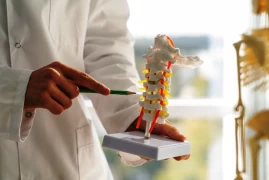
On Neck Hernia
- On Neck Hernia
- What is Neck Hernia?
- What are the Symptoms of Neck Hernia?
- What Are the Suggestions to Prevent the Formation of Neck Hernia?
- What are the Treatment Options for Neck Hernia?
- What is the Recovery Period and Process of Neck Hernia Surgery?
- Are There Risks of Neck Hernia Surgery?
What is Neck Hernia?
A neck hernia, also known as a cervical hernia, occurs when the inner portion of a spinal disc protrudes through a weakened area in the cervical spine. This condition can cause pain, numbness, and weakness in the neck, shoulders, arms, and hands. In severe cases, surgery may be necessary to alleviate symptoms and prevent further damage.
What are the Symptoms of Neck Hernia?
Symptoms of a neck hernia may include neck pain, stiffness, and muscle spasms. Pain may radiate down the arms and into the hands, and there may be weakness or numbness in the affected areas. In some cases, a cervical hernia can compress the spinal cord, leading to more serious symptoms such as difficulty walking, loss of coordination, and loss of bowel or bladder control. If you experience any of these symptoms, it is important to seek medical attention immediately.
What Are the Suggestions to Prevent the Formation of Neck Hernia?
Neck hernia is a condition that occurs as a result of damage to the discs between the neck vertebrae. These discs provide mobility of the spine and protect the spinal cord. Neck hernia is usually caused by long-term repetitive movements or incorrect postures.
To prevent neck hernia, you can follow these suggestions:
- Correct posture: Correct posture is very important in preventing neck hernia. When using a computer or working at a desk, keep your back straight and pull your shoulders back. Also, stand up straight by pulling your shoulders back when standing or walking.
- Exercise: Exercise can be beneficial to strengthen your neck muscles. You can try activities like yoga or pilates to strengthen your neck muscles. However, you should not over-extend while exercising.
- Choosing the right pillow: Choosing the right pillow is also important to prevent neck hernia. Make sure your pillow supports your neck area. The firmness or softness of your pillow can vary based on personal preference.
- Take a break: Take regular breaks and stretch your muscles when you sit or stand for long periods of time. Taking a break can reduce your risk of cervical disc herniation.
- Lifting a load: When lifting a load, be careful to balance the weight of the load. It's also important to warm up and stretch your muscles before lifting the load.
These recommendations can help prevent neck hernia. However, if you already have a herniated neck or are experiencing severe neck pain, it is important to consult a doctor.
What are the Treatment Options for Neck Hernia?
The first step in the treatment of a herniated disc is usually conservative measures such as physical therapy, chiropractic care, and medications to manage pain and inflammation. If these methods do not provide relief or if symptoms worsen, surgery may be recommended.
There are several surgical options to treat neck hernia. The most common procedure is a discectomy, which involves removing the disc between the vertebrae that is pressing on the neural tissue to reduce pressure on the spinal cord or nerve roots. This is the procedure of relaxing the nerve tissue under a microscope with a small skin incision.
In some cases, fusion surgery may be required to stabilize the cervical spine, to prevent hernia recurrence and excessive movement in the neck. This involves fusing two or more vertebrae using bone grafts and metal hardware. Cervical disc prosthesis is placed in place of the evacuated disc in suitable patients, and it is aimed to keep the movement in the neck close to the physiological limits and to try to protect the spine health.
The type of surgery recommended will depend on the location and severity of the hernia, as well as other factors such as the patient's age and general health.
What is the Recovery Period and Process of Neck Hernia Surgery?
Recovery time after neck hernia surgery may vary depending on the type of operation performed. In general, patients can expect to stay in the hospital for several days after surgery and may need to limit their physical activity. In addition, discharged patients may need to use a collar for a certain period of time. Physical therapy is also recommended to help restore strength and mobility.
Are There Risks of Neck Hernia Surgery?
As with any surgery, there are risks associated with neck hernia surgery, such as bleeding, infection, and nerve damage. However, the overall success rate of these procedures is high, and most patients experience significant improvements in their symptoms and quality of life.
Komplikasyon riskini azaltmak ve mümkün olan en iyi sonucu elde etmek için, boyun fıtığı ameliyatlarında başarısı kanıtlanmış deneyimli bir cerrah seçmek önemlidir. Doktorunuz, özel ihtiyaçlarınıza göre ameliyatınızı programlayacaktır.





